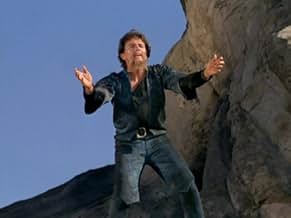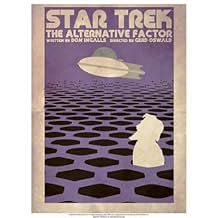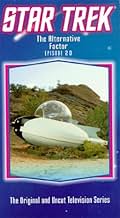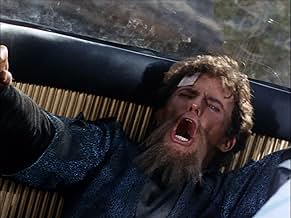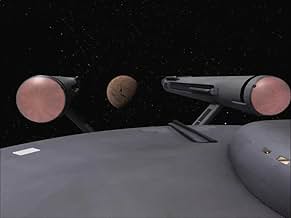The Alternative Factor
- Folge lief am 14. Dez. 1987
- 12
- 50 Min.
IMDb-BEWERTUNG
5,7/10
4266
IHRE BEWERTUNG
Füge eine Handlung in deiner Sprache hinzuExistence itself comes under threat from a man's power-struggle with his alternate self, with the Enterprise's strained dilithium crystals presenting his key to a final solution.Existence itself comes under threat from a man's power-struggle with his alternate self, with the Enterprise's strained dilithium crystals presenting his key to a final solution.Existence itself comes under threat from a man's power-struggle with his alternate self, with the Enterprise's strained dilithium crystals presenting his key to a final solution.
- Regie
- Drehbuch
- Hauptbesetzung
Bill Blackburn
- Lieutenant Hadley
- (Nicht genannt)
Vince Cadiente
- Security Guard
- (Nicht genannt)
Bill Catching
- Anti-Matter Lazarus Being #2
- (Nicht genannt)
Frank da Vinci
- Crewman
- (Nicht genannt)
Carey Foster
- Enterprise crewmember
- (Nicht genannt)
Tom Lupo
- Security Guard
- (Nicht genannt)
Al Wyatt Sr.
- Anti-Matter Lazarus Being #1
- (Nicht genannt)
Empfohlene Bewertungen
Yes, it's true, this is one of the worst episodes in the entire series, right down there with "The Empath." Yes, Lazarus is one of the most irritating characters, always falling off cliffs to move the story (such as it is) along.
The *only* thing that's interesting in this episode is when Lazarus finally explains how his cat-and-mouse with his alternate-universe counterpart came about. Both the sci-fi physics element and the madman element of the premise are fascinating. But this explanation comes in the last 5 minutes of the show, after 40 minutes of exhausting shenanigans -- too late to even buy the "r" in the word "redeem."
I would love to know the backstory about how this episode went from fascinating concept to crummy filmed episode. Perhaps that would help ease the pain that this entry's very existence creates in the beating heart of the series.
Another interesting bit about this episode is that with it, the series nearly bottoms out before rocketing to the top with the very next episode, "City on the Edge of Forever." From the very bottom, the only way to go is up.
The *only* thing that's interesting in this episode is when Lazarus finally explains how his cat-and-mouse with his alternate-universe counterpart came about. Both the sci-fi physics element and the madman element of the premise are fascinating. But this explanation comes in the last 5 minutes of the show, after 40 minutes of exhausting shenanigans -- too late to even buy the "r" in the word "redeem."
I would love to know the backstory about how this episode went from fascinating concept to crummy filmed episode. Perhaps that would help ease the pain that this entry's very existence creates in the beating heart of the series.
Another interesting bit about this episode is that with it, the series nearly bottoms out before rocketing to the top with the very next episode, "City on the Edge of Forever." From the very bottom, the only way to go is up.
There is a solid sci-fi premise here, though the stakes should have been dialed way back. I hated this as a kid and now just see it as extremely silly.
But turkey though it may be, EVERYBODY remembers this one. I actually liked the George Jettson personal spaceship.
To be fair, any potential this episode had was destroyed by the original actor cast as Lazarus not showing up. The replacement went directly from casting to shooting with no time to prepare. Despite being handed a quite complex role.
But turkey though it may be, EVERYBODY remembers this one. I actually liked the George Jettson personal spaceship.
To be fair, any potential this episode had was destroyed by the original actor cast as Lazarus not showing up. The replacement went directly from casting to shooting with no time to prepare. Despite being handed a quite complex role.
The threat which Kirk and the Federation face here is nothing less than the complete annihilation of our entire universe - surely the gravest cosmic problem encountered in Trek's history. It's one of those wild cosmic concepts more prevalent on the TNG series, not restricted to a quadrant or even just our galaxy, but everything. However, the execution of this story and the faulty pace of this episode is rather deplorable. There's way too much repetition throughout: Kirk and some crew beam down to a planet's surface, they go back up to the Enterprise, then back down to the planet, over & over, it seems, with no results; Lazarus falls off a cliff a 2nd time...or is it a 3rd? Much of the attempted efforts to explain the dangerous cosmic effect come off as gobbledygook - is it a doorway in space? A hole between two universes? A corridor with explosions at both ends? Say what? There's also confusion on whether Kirk is dealing with a time traveler here or hopping to parallel dimensions (better realized in "Mirror,Mirror" early in the 2nd season). I finally gathered in the end that the threat revolved around matter and anti-matter of two duplicate objects coming together; but, boy, what a headache to get there.
Kirk, Spock and the others encounter a weird guy named Lazarus on a barren planet following a 'winking out' of all existence. He rants on about his nemesis, an enemy which looks humanoid but is a monster. By the 2nd act, we realize this Lazarus is insane, but Kirk & especially McCoy aren't so quick on the uptake, while Spock just calls him a liar. After a few very spacey phrases by this Lazarus, I would think they'd realize the guy's not all there when Lazarus says "Kill! Kill! Kill! Kill! Kill!" Yet, as in a few other weak episodes, an obvious nutcase like this one is given free reign within the Enterprise and this causes problems later (I think Kirk did assign security at some point, but they lost Lazarus a minute later). Then we get that 'cosmic effect' and negative images in slow motion for the 4th or 5th time, meant to convey a struggle between - wait for it - two Lazarus dudes! And as we all know, two into one won't go. This episode gets my vote for the worst one of the first season, a precursor to all those really bad, boring ones in the third season. I do give it more stars than those due to a genuinely chilling denouement at the conclusion.
Kirk, Spock and the others encounter a weird guy named Lazarus on a barren planet following a 'winking out' of all existence. He rants on about his nemesis, an enemy which looks humanoid but is a monster. By the 2nd act, we realize this Lazarus is insane, but Kirk & especially McCoy aren't so quick on the uptake, while Spock just calls him a liar. After a few very spacey phrases by this Lazarus, I would think they'd realize the guy's not all there when Lazarus says "Kill! Kill! Kill! Kill! Kill!" Yet, as in a few other weak episodes, an obvious nutcase like this one is given free reign within the Enterprise and this causes problems later (I think Kirk did assign security at some point, but they lost Lazarus a minute later). Then we get that 'cosmic effect' and negative images in slow motion for the 4th or 5th time, meant to convey a struggle between - wait for it - two Lazarus dudes! And as we all know, two into one won't go. This episode gets my vote for the worst one of the first season, a precursor to all those really bad, boring ones in the third season. I do give it more stars than those due to a genuinely chilling denouement at the conclusion.
Enterprise encounters a violent and unusual physical phenomenon.
This is an interesting episode based on a brilliant idea, but unfortunately the screenplay does not translate to the screen very well.
The plot must have sounded fantastic when it was first discussed and its introductory scene is very intriguing. Unfortunately it unfolds in a sometimes boring way, with several long winded, repetitive visuals and some big exposition dialogues.
I love parallel universe stories and the matter v antimatter concept is a great idea, unfortunately what presents on screen makes little sense by the description of it's own technobabble.
There are also some plot points that are ludicrous. Lazarus is obviously a threat yet has free run of the ship on more than one occasion.
It's not all bad. Some visuals work well, like Lazarus's spacecraft on the planet surface, along with the cinematography and acting. Also it finishes strongly with Kirk helping to save two universes and leaves on poignant note about the poor guest character.
William Shatner, Leonard Nimoy and Robert Brown are solid, particularly Brown playing the two versions of the guest character.
For me it's a 5.5/10, but I round upwards.
This is an interesting episode based on a brilliant idea, but unfortunately the screenplay does not translate to the screen very well.
The plot must have sounded fantastic when it was first discussed and its introductory scene is very intriguing. Unfortunately it unfolds in a sometimes boring way, with several long winded, repetitive visuals and some big exposition dialogues.
I love parallel universe stories and the matter v antimatter concept is a great idea, unfortunately what presents on screen makes little sense by the description of it's own technobabble.
There are also some plot points that are ludicrous. Lazarus is obviously a threat yet has free run of the ship on more than one occasion.
It's not all bad. Some visuals work well, like Lazarus's spacecraft on the planet surface, along with the cinematography and acting. Also it finishes strongly with Kirk helping to save two universes and leaves on poignant note about the poor guest character.
William Shatner, Leonard Nimoy and Robert Brown are solid, particularly Brown playing the two versions of the guest character.
For me it's a 5.5/10, but I round upwards.
One thing that must be considered is that the show didn't have any single dedicated writer or writers, there were many different writers of any one episode to the next.
The person who wrote this particular episode was Don Ingalls, who was a fairly prolific television writer from the early 1960's to mid 1980's. If not prolific, he received a lot of work. It's the only Star Trek episode he is credited with "written by." He is also has a "story by" credit for the 'A Private Little War' episode. That's it.
There were numerous other writers in the series, many for just one episode, so there almost has to be a few misfires, just based on simple probability. This one isn't the strongest, admittedly. It was probably too ambitious and ended up spinning it's wheels. To start with, there's some goofy special effects. Interesting sci-fi themes are explored, but the explanations are vague (or wrong) and unfortunately never tied up. Guest star Robert Brown as Lazarus is in some scenes brilliant, and in others seems over the top. Still, I feel there's enough done well here to make it a worthwhile watch. If nothing else, it's memorable.
The person who wrote this particular episode was Don Ingalls, who was a fairly prolific television writer from the early 1960's to mid 1980's. If not prolific, he received a lot of work. It's the only Star Trek episode he is credited with "written by." He is also has a "story by" credit for the 'A Private Little War' episode. That's it.
There were numerous other writers in the series, many for just one episode, so there almost has to be a few misfires, just based on simple probability. This one isn't the strongest, admittedly. It was probably too ambitious and ended up spinning it's wheels. To start with, there's some goofy special effects. Interesting sci-fi themes are explored, but the explanations are vague (or wrong) and unfortunately never tied up. Guest star Robert Brown as Lazarus is in some scenes brilliant, and in others seems over the top. Still, I feel there's enough done well here to make it a worthwhile watch. If nothing else, it's memorable.
Wusstest du schon
- WissenswertesThis is the first time that live two-way communication with Starfleet Command is depicted. In previous episodes, communication with Starfleet Command was through delayed radio messages.
- PatzerAt the very beginning when Spock is reporting the atmospheric composition of the planet he has scanned he says "Oxygen Hydrogen atmosphere". This would be a very explosive combination. He meant to say "Oxygen Nitrogen atmosphere" (similar to Earth) but just got his line wrong.
- Crazy CreditsThe closing credits are set against a combination background of stills from that episode and previous episodes.
- Alternative VersionenSpecial Enhanced version Digitally Remastered with new exterior shots and remade opening theme song
- VerbindungenFeatured in Mr. Plinkett's Star Trek 2009 Review (2010)
- SoundtracksTheme From Star Trek
Written by and credited to Alexander Courage
Top-Auswahl
Melde dich zum Bewerten an und greife auf die Watchlist für personalisierte Empfehlungen zu.
Details
Zu dieser Seite beitragen
Bearbeitung vorschlagen oder fehlenden Inhalt hinzufügen


